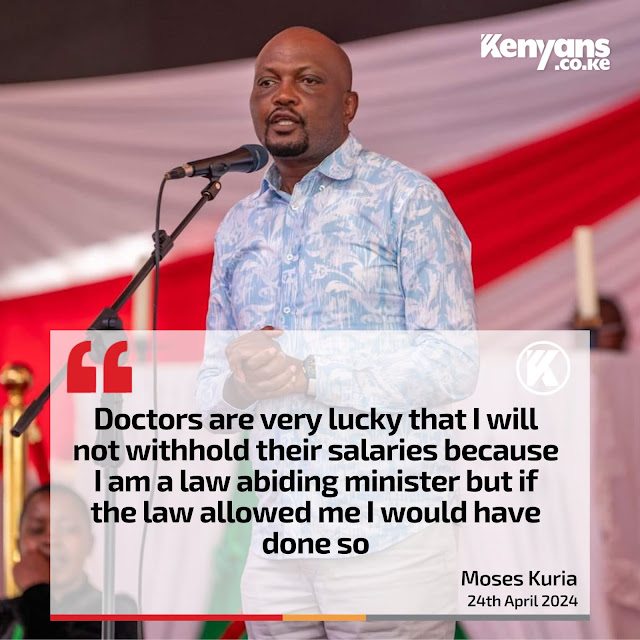Search This Blog
"Truth comes only to conquer those who have lost the art of receiving it as a friend." ~ Ravi Thakur
Featured
- Get link
- X
- Other Apps
The Deteriorating State of Healthcare and Governance Under William Ruto, Kenya Kwanza Government's Arrogant Grandstanding, and Moses Kuria's Unintelligent Solution To the Doctors' Strike
Public Service CS Moses Kuria has once again opened his mouth...and swiftly put the other foot in! (A foot which, if you will recall, was not too long ago saved from permanent disability by the very doctors he is now denigrating.) We have an old saying in Kiswahili: Asante ya punda ni mateke. And Moses Kuria is kicking away like his legs depends on it.
The ongoing doctors' strike, now in its gobsmacking 44th day, is a stark reminder of the deep-seated issues plaguing Kenya under the leadership of William Ruto and his Kenya Kwanza government. The proposal by President William Ruto and echoed by his CS Moses Kuria to limit the number of students studying medicine (a project they set in motion earlier this year by moderating the 2023 results and mass-failing students to limit the number of university entries, ergo medical students—Kuria is just making the official announcement) is not only shortsighted but emblematic of a larger pattern of incompetence and acute disconnection from the needs of Kenyans.
In his arrogance, acutely emblematic of the Ruto regime, Moses Kuria says he has "enough advisors." But clearly they are either overwhelmed or as incompetent as their overlord. So here is real and practical free advice:
Political Grandstanding Amidst a Healthcare Crisis
CS Moses Kuria's callous remarks on national television, dismissing the plight of medical interns and threatening to transition government workers to contract terms as a final, well-thought-out Cabinet solution, highlight a disturbing lack of empathy and understanding of the healthcare system's challenges. Imagine, if you dare, the traditional trigger-happy incompetence of Kenya Police, now coupled with contract employment. This is the calibre of leadership we have in Kenya today. Such statements not only undermine the credibility of the government but also exacerbate tensions between healthcare professionals and the administration.
Leadership in Crisis: A Government Adrift
The Ruto administration's response to the doctors' strike reflects a broader trend of mismanagement and ineptitude. From failed initiatives such as the housing levy to mishandling international affairs like the Haiti debacle, Kenya Kwanza has consistently demonstrated a lack of fresh ideas, clear vision, and effective leadership.
The Human Cost of Political Gamesmanship
While politicians engage in petty squabbles and power struggles, ordinary Kenyans bear the brunt of the healthcare crisis. Lives are at stake as hospitals remain understaffed, and essential medical services are disrupted. The longer the impasse persists, the more lives are endangered, underscoring the urgent need for swift and decisive action.
A Call for Accountability and Solutions
In the face of mounting challenges, it is imperative that the Ruto administration prioritise the well-being of its citizens over political maneuvering. This begins with acknowledging the gravity of the healthcare crisis and engaging in meaningful dialogue with healthcare professionals to address their grievances.
Practical Steps Forward
1. Immediate Resolution of the Doctors' Strike: The government must prioritise negotiations with medical professionals and expedite the resolution of the strike by addressing their concerns and providing fair compensation.
2. Investment in Healthcare Infrastructure: Long-term solutions require substantial investment in healthcare infrastructure, including staffing, equipment, and facilities, to ensure the delivery of quality healthcare services to all Kenyans.
3. Empowerment of Healthcare Professionals: Recognising the invaluable contribution of healthcare professionals, the government should prioritise their training, professional development, and well-being to retain talent and improve healthcare outcomes.
4. Transparency and Accountability: The Ruto administration must demonstrate transparency in its decision-making processes and be held accountable for its actions to rebuild public trust and confidence in governance.
The ongoing doctors' strike is not merely a healthcare issue but a symptom of deeper systemic failures within the Ruto administration. It is incumbent upon the government to prioritise the needs of its citizens, address the root causes of the crisis, and chart a path forward towards a healthier, more prosperous Kenya. Failure to do so will only perpetuate the suffering of ordinary Kenyans and erode the very fabric of society.
- Get link
- X
- Other Apps
Popular Posts

The One On Why Uganda Produces Shitty Ads
- Get link
- X
- Other Apps

Of Australian Bogans Masquerading As Creatives In Nairobi Agencies
- Get link
- X
- Other Apps



Comments
Post a Comment